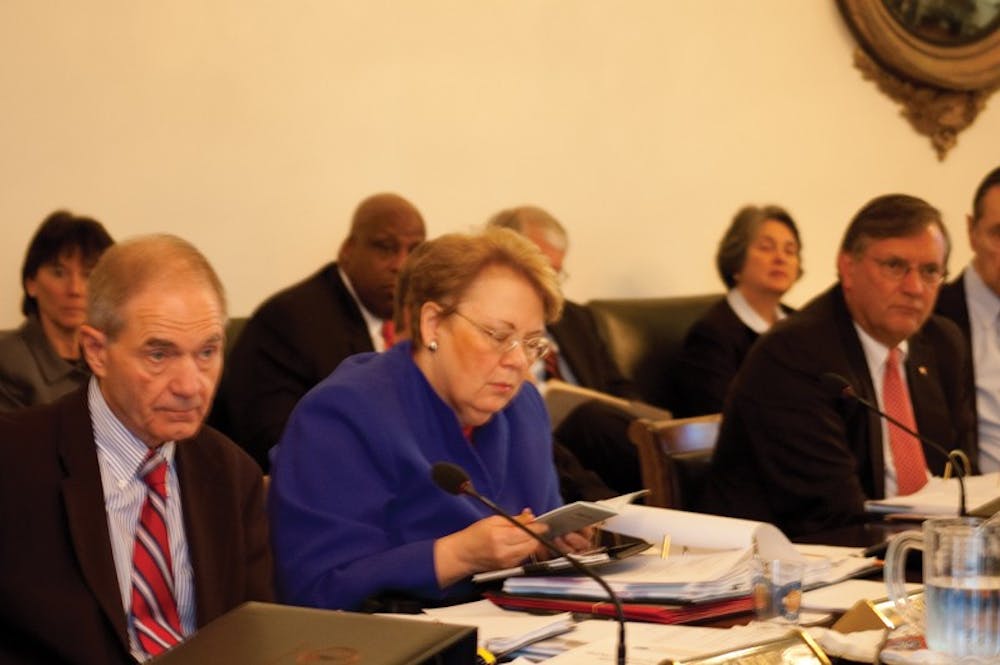The Board of Visitors approved an 8.9 percent tuition increase for all undergraduate students, as well as varying tuition increases for different graduate programs yesterday. These tuition raises come in the wake of the $15 million cut in state funding for the University.
"We've done what we can to balance our needs with the price that we recommend that we pass onto our students," said Leonard Sandridge, executive vice president and chief operating officer. Sandridge also said previous funding cuts have been passed onto the operating budgets instead of being assessed via tuition increases, and if the state had not eliminated this $15 million in aid, tuition increases would be less than 3 percent.
The new tuition and fees for an in-state undergraduate student will total to $11,576, a rise from $10,628 in the 2010-2011 school year. Out-of-state undergraduate tuition will rise from $33,574 to $36,570.
Tuition for graduate students will rise 8.9 percent for in-state and 5.1 percent for out-of-state students, while Darden in-state and out-of-state students will have tuition raises of 5.6 percent and 5.1 percent, respectively. All Commerce graduate students' tuition will rise about 4 percent, and Law School students will see tuition rise 4.9 percent for in-state and 4.4 percent for out-of-state students. Medical students' tuition will increase 9.1 percent and 4.4 percent for in-state and out-of-state first and second years, and 7.6 percent and 4 percent for years three and four. Additionally, fees for third-year Commerce students will rise $3,000.
The Board also emphasized that the University falls right in the middle of its group of peer institutions when it comes to the price of out-of-state tuition. The average cost for a private undergraduate institution remains just under $40,000 each year, and the average for out-of-state students who attend public universities is $26,888 per year.
A large point of conversation for the Board, however, was the value of a University education, particularly the price non-Virginians pay for it. Board member Austin Ligon suggested raising out-of-state tuition more.
"We are short-changing the University and our needs by not pricing what the true market charges," Ligon said. "I don't think we have any reason to subsidize wealthy out-of-state students."
Glynn Key, chair of the Educational Policy Committee, disagreed with Ligon, stressing the large numbers of middle-income and minority out-of-state students.
"The middle-income student is really where I would be concerned about the increase," Key said. "We have a percentage [now] that I think is a nice mix for the character of this university."
Board Rector John Wynne stressed the importance of carefully considering the effects of any changes such as those suggested by Ligon, adding that the Board should have addressed these monetary concerns earlier. The lack of faculty pay increases as well as the doubling of AccessUVa costs during the past four years were both cited as items of high concern.
"You need to take some actual cases and walk through them and see what happens with different kinds of folks in different kinds of circumstances," Wynne said. "What people are now trying to figure out ... is how to partner with each other."
Sandridge stressed the University has tried to maintain its reputation and academic quality even with diminishing state support. He said faculty stepping forward to teach more courses has helped greatly, but the University had to find a novel way to cut spending in the areas where it would have the smallest impact.
"You have to go down to the 63rd rank to find a university that's spending as little to graduate a student [as the University]," Sandridge said. "Historically, educational institutions have been notoriously bad at deciding what not to do. That will be a distinguishing characteristic of this institution"







